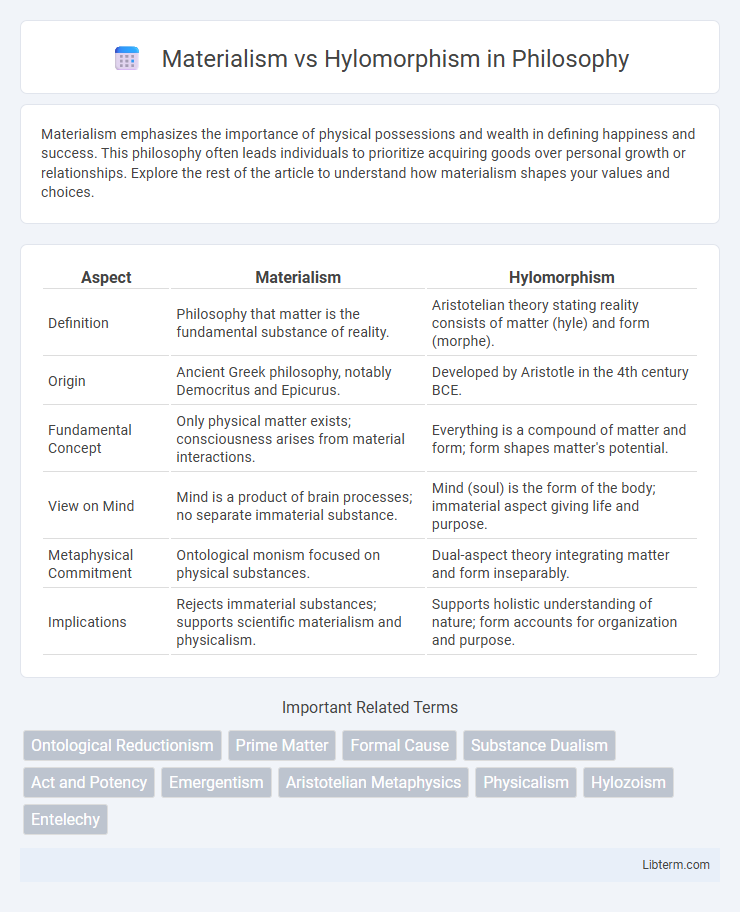Materialism emphasizes the importance of physical possessions and wealth in defining happiness and success. This philosophy often leads individuals to prioritize acquiring goods over personal growth or relationships. Explore the rest of the article to understand how materialism shapes your values and choices.
Table of Comparison
| Aspect | Materialism | Hylomorphism |
|---|---|---|
| Definition | Philosophy that matter is the fundamental substance of reality. | Aristotelian theory stating reality consists of matter (hyle) and form (morphe). |
| Origin | Ancient Greek philosophy, notably Democritus and Epicurus. | Developed by Aristotle in the 4th century BCE. |
| Fundamental Concept | Only physical matter exists; consciousness arises from material interactions. | Everything is a compound of matter and form; form shapes matter's potential. |
| View on Mind | Mind is a product of brain processes; no separate immaterial substance. | Mind (soul) is the form of the body; immaterial aspect giving life and purpose. |
| Metaphysical Commitment | Ontological monism focused on physical substances. | Dual-aspect theory integrating matter and form inseparably. |
| Implications | Rejects immaterial substances; supports scientific materialism and physicalism. | Supports holistic understanding of nature; form accounts for organization and purpose. |
Introduction to Materialism and Hylomorphism
Materialism posits that physical matter constitutes the fundamental reality, asserting that all phenomena, including consciousness, arise from material interactions. Hylomorphism, originating from Aristotle, explains existence as a combination of matter (hyle) and form (morphe), where form organizes matter into coherent substances. These frameworks offer contrasting explanations of being, with materialism emphasizing physical substance and hylomorphism integrating form and matter as inseparable principles.
Historical Background of Both Philosophies
Materialism traces its origins to ancient Greek philosophers like Democritus and Epicurus, who posited that matter is the fundamental substance of reality and everything, including consciousness, arises from material interactions. Hylomorphism, developed by Aristotle, proposes that all physical entities are composed of matter (hyle) and form (morphe), emphasizing a dual aspect where form actualizes potential matter, influencing medieval scholastic thought through thinkers like Thomas Aquinas. The historical divergence highlights materialism's emphasis on a single substance (matter) versus hylomorphism's dual-component ontology, shaping distinct metaphysical frameworks throughout Western philosophy.
Core Principles of Materialism
Materialism asserts that all phenomena, including consciousness and thought, arise from physical matter and its interactions, emphasizing that material substance is the fundamental reality. It rejects the existence of immaterial substances or forms, arguing that mental states are reducible to neurobiological processes. This core principle contrasts with hylomorphism, which posits that reality consists of both matter and form as inseparable components of substances.
Fundamental Concepts of Hylomorphism
Hylomorphism, a philosophical theory developed by Aristotle, asserts that every physical entity is a compound of matter (hyle) and form (morphe), where matter provides the substance and form gives it structure and purpose. Unlike materialism, which reduces all phenomena to physical matter alone, hylomorphism emphasizes the inseparability of matter and form in understanding existence and change. The fundamental concept of hylomorphism lies in the dynamic unity between the potentiality of matter and the actuality of form, explaining the nature of objects and their transformations.
Key Differences Between Materialism and Hylomorphism
Materialism posits that only physical matter exists, explaining consciousness and identity purely through material interactions, whereas hylomorphism asserts that reality comprises both matter and form, with form providing purpose and organization to matter. Materialism rejects any non-material essence, emphasizing the primacy of atoms, molecules, and physical processes, while hylomorphism, rooted in Aristotelian philosophy, integrates the concepts of matter (hyle) and intrinsic form (morphe) to explain substance and change. Key differences include materialism's reductionism contrasting with hylomorphism's dual-aspect ontology, where form is essential for explaining teleology and the structured nature of beings.
Famous Proponents and Their Arguments
Materialism, championed by philosophers like Karl Marx and Daniel Dennett, asserts that all phenomena, including consciousness, arise solely from physical matter and its interactions. Aristotle's hylomorphism, influential in Scholastic philosophy through Thomas Aquinas, argues for the unity of matter and form, where the soul (form) actualizes the body (matter). Dennett critiques hylomorphism for lacking empirical basis, while Aquinas counters materialism's reductive view by emphasizing metaphysical principles that explain the essence and purpose beyond mere physical components.
Materialism in Modern Science and Culture
Materialism in modern science emphasizes that all phenomena, including consciousness and life, arise from physical matter and its interactions, aligning closely with a scientific worldview grounded in empirical evidence and neurobiology. This perspective underpins much of contemporary neuroscience, quantum physics, and technological innovation, reinforcing material explanations over metaphysical or dualistic interpretations. In culture, materialism influences secular ethics, consumer behavior, and debates on the nature of reality by prioritizing tangible, measurable entities over abstract or spiritual concepts.
Hylomorphism’s Influence on Metaphysics
Hylomorphism, rooted in Aristotle's philosophy, posits that all physical entities consist of matter and form, fundamentally shaping metaphysical discussions about the constitution of reality. Its influence extends to contemporary metaphysics by offering a framework that integrates substance and essence, challenging purely materialistic explanations. This dual-aspect approach addresses issues of identity, change, and causality in metaphysical inquiry, emphasizing the inseparable relationship between form (the organizing principle) and matter (the underlying substrate).
Criticisms and Counterarguments
Materialism faces criticism for its inability to adequately explain consciousness and mental phenomena solely through physical processes, often labeled as reductionist and overlooking subjective experiences. Hylomorphism counters this by positing that form and matter are inseparable, arguing that form (or soul) provides an essential organizing principle that materialism neglects. Critics of hylomorphism argue that its metaphysical concepts lack empirical support and risk introducing non-physical entities without clear scientific evidence.
Conclusion: The Ongoing Debate
The ongoing debate between materialism and hylomorphism centers on the nature of substance and form in explaining reality. Materialism asserts that only physical matter constitutes existence, while hylomorphism posits that both matter and form are essential to understanding being. This philosophical discourse continues to influence contemporary metaphysics, cognitive science, and the philosophy of mind.
Materialism Infographic

 libterm.com
libterm.com